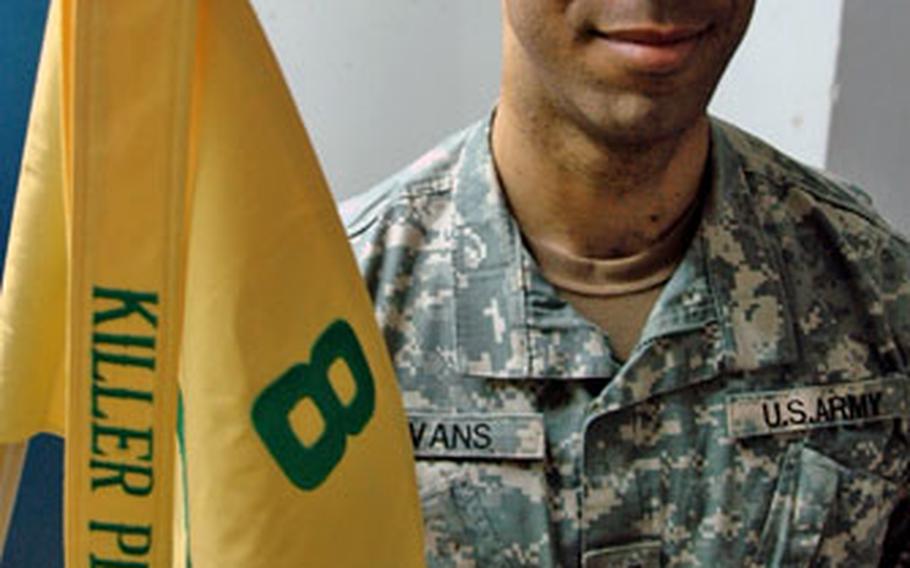
Capt. Johnny Evans, commander of Company D, 1st Battalion, 8th Regiment, part of the 4th Infantry Division, has found aspects of central Iraq reminiscent of his childhood in the Washington, D.C., suburbs. (Anita Powell / Stars and Stripes)
FORWARD OPERATING BASE O’RYAN, Iraq — After a rough childhood in the crime-ridden Washington, D.C., suburbs, Capt. Johnny Evans found something unexpectedly familiar about his first deployment to central Iraq.
“I tell people back home, in a way, this is similar to the ghetto,” said Evans, 33, who leads Company D, 1st Battalion, 8th Regiment, part of the 4th Infantry Division of Fort Carson, Colo.
“I’m not trying to sound funny,” he said. “This is home. This is an urban environment. It’s hot and there are big bugs. But I can name people at home like this. I know people like these guys. I know how to deal with these guys.”
The streets of his childhood, he said — filled as they were with petty and not-so-petty criminals — bear much resemblance to the Hobbesian streets of towns like Ad Dujayl, where residents struggle for survival in a country where life is harsh, violent and often cut short.
“It’s a survival mentality,” he said. “You can’t see past tomorrow. You know who the criminals are but you can’t tell, because you’re scared they’ll come hurt you. You see people who are trying to make a difference get killed. That’s discouraging.”
Company 1st Sgt. Arturo Jurado, 38, a native of Celaya, Guanajuato, Mexico, said Evans’ comparison is apt.
“This place reminds me of Mexico,” Jurado said. “It’s pretty much the same system: You can’t trust the police, and you can’t trust the army. You have to always be paying off somebody. I relate to the police, I relate to the army, I relate to the people.”
That familiarity, Evans said, allows him and others in his company to better navigate the local power structure.
“It’s all about manipulation,” he said. “I know they try to manipulate me on a daily basis. I know many of them look at the U.S. as a big bank, as a wallet. Everybody has an agenda. From interpreters to the smiling mayors to the Iraqi army to the police chiefs to the coalition. All of us do.”
His, he said, is to watch, wait and try to sift out the petty criminals from the prime movers in the insurgency.
“I’m watching them,” he said. “I’ve got names. I’m waiting for them to slip up and then I’ve got them.”
First Lt. Kirk Bailey, 25, leader of the company’s 3rd Platoon, said the call of crime is, currently, too alluring to many Iraqis.
“It’s too easy to be an insurgent here,” he said. “It’s too easy.”
He credited locals’ reticence to inform on their neighbors to fear.
“Does a cop stay outside your door after you rat on the drug dealer in your town? No,” he said. “These people feel that they could tell you what’s going on, but at the same time, they want us out of here.”
Evans, who is black, compared the struggle to that faced by upwardly mobile blacks living in America’s roughest cities.
“I say these people have a chance,” he said. “I did. My forefathers did. I believe in this country.”
Besides, he said, “the sacrifices we make here, I’ll be damned if it’s for nothing.”